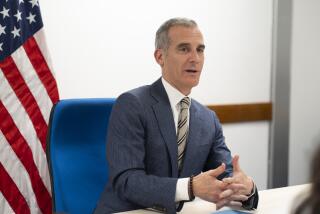U.S. Official Vows to Help India in Terror War
- Share via
NEW DELHI — The U.S. ambassador to India said Wednesday that Washington and New Delhi were on the brink of a major relationship and pledged that the war against terror would not be over until terrorism ended against both countries.
“A terrorist is a terrorist,” Ambassador Robert Blackwill said in reply to a question about Pakistan’s support for militants fighting Indian rule in the northern state of Jammu and Kashmir.
“They are not freedom fighters. No country will be permitted to provide sanctuaries to terrorists,” Blackwill said.
New Delhi accuses Islamabad of promoting “cross-border terrorism” by funding, arming and training foreign militants to fight in a revolt against Indian rule in Kashmir. Pakistan says it gives only moral support to “a freedom struggle.”
Indian border guards Wednesday killed a dozen guerrillas as they crossed into Kashmir from Pakistan, police said.
“They [infiltrators] were asked to surrender, but they started running. . . . The boys opened fire and killed 12 of them,” a police officer said about the encounter in Ramgarh, about 40 miles from the state’s winter capital, Jammu.
India, one of the first nations to line up behind the U.S. in its efforts to fight terrorism after the Sept. 11 attacks, was dismayed by the United States’ choice of Pakistan as a key ally in the military campaign in Afghanistan.
Blackwill called Islamabad a valuable member of the international coalition against terrorism but said terror would not be tolerated anywhere.
“The fight against terrorism will not end until terrorism against the United States as well as India has ended. We are in this together,” he told a news conference for foreign journalists.
Indian government leaders have refused to resume peace talks with Pakistan and say Islamabad continues to help guerrillas in Muslim-majority Kashmir despite the global campaign against terrorism.
However, Indian Home Minister Lal Krishna Advani said the government was willing to negotiate with Kashmiri groups, including militant organizations, to end the bloodshed in the Himalayan region.
Blackwill said the United States and India were on the cusp of a “major relationship” after President Bush met Indian Prime Minister Atal Behari Vajpayee this month in what the ambassador called the most substantive summit between the two countries in the last 50 years.
The two nations would resume defense cooperation--disrupted by Indian nuclear tests in 1998--including arms sales, joint military exercises and training of military personnel, he said.
They also would work on counter-terrorism measures including fighting cyber-terrorism and sharing intelligence.
More to Read
Sign up for Essential California
The most important California stories and recommendations in your inbox every morning.
You may occasionally receive promotional content from the Los Angeles Times.













